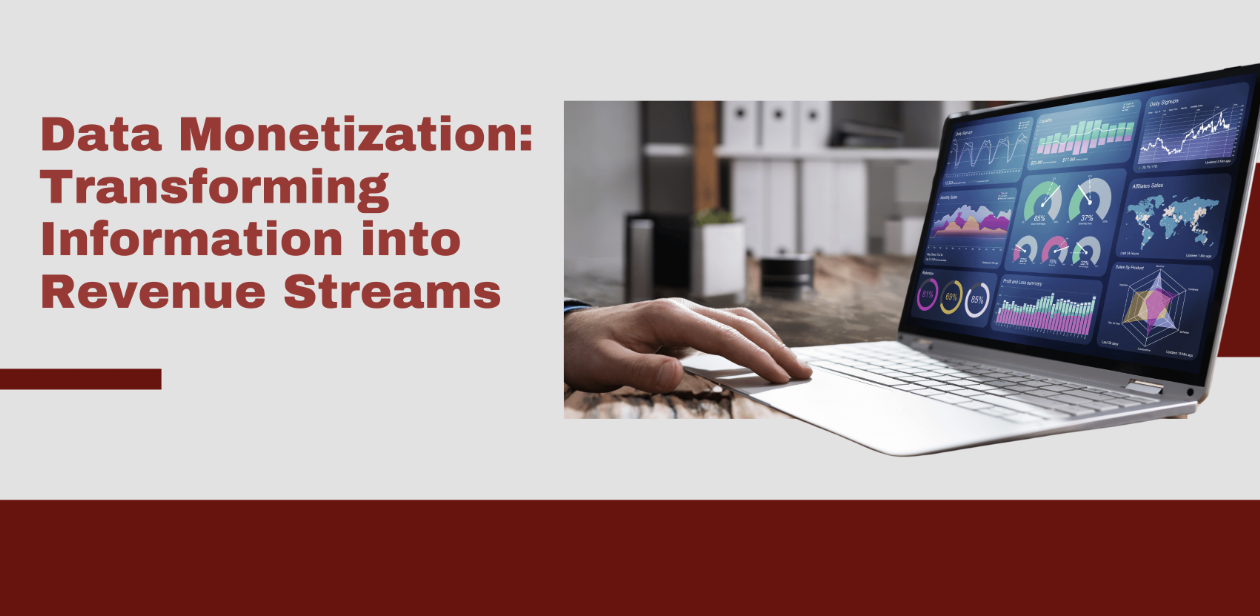As someone deeply involved in the intricacies of the business world, it’s important for me to explain and crucial for you to understand the dual forces shaping our data-driven environment.
That’s why today, I want to talk about two important topics: data monetization and data cleansing. I’ll start by diving into how data monetization can turn information into a profitable asset, a strategy that’s becoming increasingly vital in our competitive market. Then, I’ll shift our focus to data cleansing, underscoring its significance in maintaining the integrity and usefulness of our data.
These topics are not just relevant but essential for anyone looking to navigate the complex landscape of modern business successfully.
Power of Data Monetization in Today’s Business Landscape
Exploring the World of Data Monetization
The Rise of Data Monetization:
Data monetization is not just a buzzword but a rapidly growing discipline. A report by Allied Market Research pegs the global data monetization market at $2.1 billion in 2020, expecting it to soar with a compound annual growth rate of 22.1% until 2030. Companies that excel in data monetization are reaping substantial benefits, with some high-performing firms reporting over 20% of their revenues coming from these efforts.
The Strategic Value of First-Party Data:
The shift towards prioritizing first-party data is crucial in the era of data monetization. As third-party cookies become obsolete, businesses that focus on collecting and utilizing first-party data are paving the way for more personalized customer experiences and stronger, consent-based consumer relationships. This approach not only enhances customer engagement but also ensures compliance with evolving data privacy laws.

Success Stories in Data Monetization:
A prime example of data monetization success is Walmart with its Walmart Luminate platform. By leveraging shopper data, Walmart has significantly increased its e-commerce revenue and expanded its network of suppliers. This model exemplifies how sharing data with business partners can lead to improved marketing strategies, targeted advertising, and overall business growth.
The Necessity of a Centralized Data Management System:
For effective data monetization, a centralized data management system is key. A customer data platform (CDP) plays a critical role in consolidating data from various touchpoints, aiding in complying with privacy regulations, and enabling more informed business decisions. This consolidated approach to data management facilitates better marketing campaigns, enhanced customer experiences, and improved product offerings.
Data Monetization: Tactics and Strategies
Turning Insights into Income:
It’s about transforming every interaction and transaction into valuable insights. Recognizing and monetizing patterns in customer behavior can lead to innovative product and service offerings. For instance, identifying gym attendance patterns has allowed fitness companies to tailor their offerings for post-work sessions.
Personalization as a Revenue Driver:
Delivering personalized experiences based on comprehensive data analysis is key to customer loyalty and increased sales. This strategy goes beyond conventional product recommendations to offering unique services and experiences tailored to individual customer profiles.
Putting Data to Work: Practical Applications
Enhancing Products and Experiences:
Data monetization is not just theoretical but a practical tool used across industries. For example, utilizing customer feedback data to refine product offerings or employing website behavior analysis to personalize user journeys demonstrates the tangible benefits of data-driven strategies.
Empowering AI:
Feeding data into AI algorithms to build intelligent systems that automate tasks, predict trends, and aid in data-driven decision-making is another facet of data monetization. Tools like Hugging Face and LM Studio are making AI more accessible and privacy-compliant for businesses.
Conclusion: The Future of Business is Data-Driven
Data monetization is about fueling business growth through insightful, predictive, and personalized strategies. By embracing these approaches, businesses can unlock new revenue streams, secure competitive advantages, and deliver exceptional value through continuous feedback and insightful actions. The art of monetizing it becomes a key differentiator in the business landscape
The Synergy of Data Monetization and Data Cleansing
The intersection of data monetization and data cleansing highlights a crucial aspect of modern business operations. While data monetization focuses on extracting value from data, the effectiveness of this process is heavily reliant on the accuracy and reliability of the data itself, underscoring the importance of data cleansing. As we explore the nuances of data cleansing, it becomes clear how it forms the backbone of successful data monetization strategies.
Understanding the Critical Role of Data Cleansing
The Essence of Data Cleansing:
Data cleansing is a vital process involving the analysis, identification, and correction of errors within a dataset. It’s a task that directly impacts a business’s ability to make informed decisions and maintain accurate records. By rectifying inaccuracies, removing duplicates, and addressing structural errors, data cleansing ensures the integrity and usefulness of business data.
Enhancing Customer Insight and Decision-Making:
With clean data, businesses gain deeper and more accurate insights into their customers, enabling them to tailor marketing strategies and customer experiences effectively. Moreover, clean data across various departments facilitates better decision-making, reducing the risk of costly errors and inefficiencies.
Reducing Compliance Risks:
In the age of stringent data regulations like GDPR, maintaining clean data is not just a matter of efficiency but also compliance. Regular data cleansing minimizes the risk of contacting individuals who have opted out of communication, thereby avoiding potential legal penalties and safeguarding customer privacy.
Improving Internal Systems and Productivity:
Accurate data is crucial for efficient internal communication and issue resolution. Clean data ensures employees have easy access to necessary business documents and information, leading to improved workplace productivity and effectiveness.
Boosting Business Revenue and Reputation:
Dirty data can have a detrimental effect on business finances, from ineffective customer segmentation to increased customer churn. Clean data supports better targeting and engagement strategies, leading to increased customer response rates and engagement. Additionally, avoiding data duplication and outdated information protects a business’s reputation and enhances brand integrity.
The Synergy with Data Monetization
| Data Cleansing as a Revenue Enabler: Clean data is a foundational element in effective data monetization strategies. It allows for accurate analysis, reliable insights, and targeted actions, all of which are essential for transforming data into profitable assets. Streamlining Marketing and Sales Efforts: For data monetization efforts to be successful, the underlying data must be accurate and up-to-date. Data cleansing ensures that marketing and sales strategies are based on reliable information, thereby enhancing the effectiveness of these efforts and improving ROI. Outsourcing Data Cleansing: A Strategic Move The Challenges of In-House Data Cleansing: Maintaining a clean database can be a resource-intensive and time-consuming task. In-house efforts often divert attention and resources away from core business activities. Benefits of Outsourcing: Outsourcing data cleansing to skilled professionals allows businesses to focus on their core competencies while ensuring their data is meticulously managed. With access to specialized tools and expertise, outsourced services can enhance data quality more efficiently and effectively, supporting robust data monetization strategies. Conclusion: Clean Data for a Data-Driven Future Data is a strategic initiative that enhances data monetization efforts, supports informed decision-making, and drives business growth. By prioritizing data quality, businesses can unlock the full potential of their data assets, paving the way for continued success and innovation. |
Sources:

